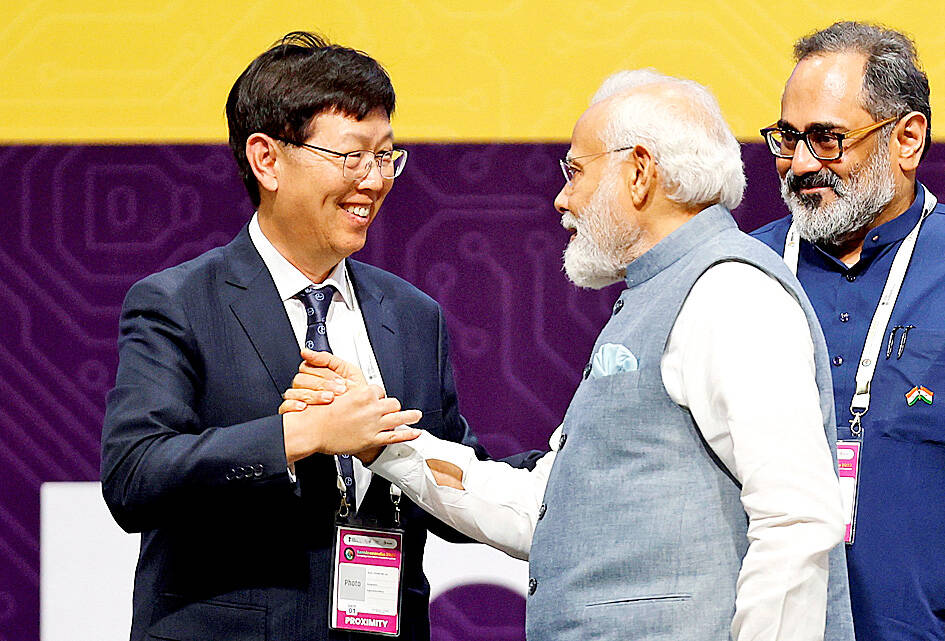Apple Inc partner Hon Hai Precision Industry Co (鴻海精密), known internationally as Foxconn Technology Group (富士康科技集團), plans to double its investment and employment in India, highlighting an accelerating manufacturing shift away from China as tensions grow between Washington and Beijing.
V. Lee (李嘉恩), a Foxconn representative in India, said in a LinkedIn post on Sunday that the Taiwanese company plans to double the size of its business in the South Asian country, as he congratulated Indian Prime Minister Narendra Modi with his birthday. He did not give details.
“We will work even harder to present you with a greater birthday gift next year, aiming for another doubling of employment, FDI, and business size in India,” Lee wrote.

Photo: Reuters
The Taiwanese company’s investment plans include a 121-hectacre site close to the airport in Bengaluru, the capital of Karnataka, Bloomberg News previously reported. That plant is likely to assemble iPhones and is expected to create about 100,000 jobs.
Hon Hai’s expansion into India underscores how China is at risk of losing its status as the world’s largest producer of consumer electronics. Apple and other US brands are leaning on their Chinese-based suppliers to explore alternative locations such as India and Vietnam. It is a rethink of the global supply chain that has accelerated during the COVID-19 pandemic and the war in Ukraine, and could reshape the way global electronics are made.
Hon Hai chairman Young Liu (劉揚偉) last month reaffirmed the company’s intention to increase investments in India, where it already operates nine production campuses and more than 30 factories employing tens of thousands of people. The company is in the early stages of expanding further in the country, where it takes in about US$10 billion of revenue annually, Liu said.

When an apartment comes up for rent in Germany’s big cities, hundreds of prospective tenants often queue down the street to view it, but the acute shortage of affordable housing is getting scant attention ahead of today’s snap general election. “Housing is one of the main problems for people, but nobody talks about it, nobody takes it seriously,” said Andreas Ibel, president of Build Europe, an association representing housing developers. Migration and the sluggish economy top the list of voters’ concerns, but analysts say housing policy fails to break through as returns on investment take time to register, making the

‘SILVER LINING’: Although the news caused TSMC to fall on the local market, an analyst said that as tariffs are not set to go into effect until April, there is still time for negotiations US President Donald Trump on Tuesday said that he would likely impose tariffs on semiconductor, automobile and pharmaceutical imports of about 25 percent, with an announcement coming as soon as April 2 in a move that would represent a dramatic widening of the US leader’s trade war. “I probably will tell you that on April 2, but it’ll be in the neighborhood of 25 percent,” Trump told reporters at his Mar-a-Lago club when asked about his plan for auto tariffs. Asked about similar levies on pharmaceutical drugs and semiconductors, the president said that “it’ll be 25 percent and higher, and it’ll

NOT TO WORRY: Some people are concerned funds might continue moving out of the country, but the central bank said financial account outflows are not unusual in Taiwan Taiwan’s outbound investments hit a new high last year due to investments made by contract chipmaker Taiwan Semiconductor Manufacturing Co (TSMC, 台積電) and other major manufacturers to boost global expansion, the central bank said on Thursday. The net increase in outbound investments last year reached a record US$21.05 billion, while the net increase in outbound investments by Taiwanese residents reached a record US$31.98 billion, central bank data showed. Chen Fei-wen (陳斐紋), deputy director of the central bank’s Department of Economic Research, said the increase was largely due to TSMC’s efforts to expand production in the US and Japan. Investments by Vanguard International

WARNING SHOT: The US president has threatened to impose 25 percent tariffs on all imported vehicles, and similar or higher duties on pharmaceuticals and semiconductors US President Donald Trump on Wednesday suggested that a trade deal with China was “possible” — a key target in the US leader’s tariffs policy. The US in 2020 had already agreed to “a great trade deal with China” and a new deal was “possible,” Trump said. Trump said he expected Chinese President Xi Jinping (習近平) to visit the US, without giving a timeline for his trip. Trump also said that he was talking to China about TikTok, as the US seeks to broker a sale of the popular app owned by Chinese firm ByteDance Ltd (字節跳動). Trump last week said that he had